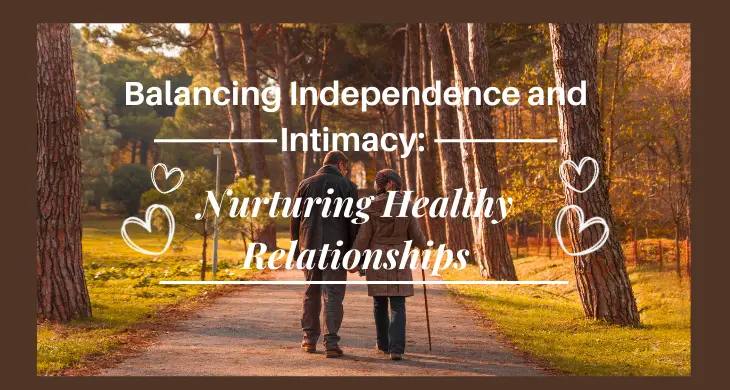Introduction
In any relationship, whether romantic or platonic, finding the right balance between independence and intimacy is crucial. Striking this delicate balance allows individuals to maintain their sense of self while fostering a deep and meaningful connection with others. In this article, we will explore the dynamics of independence and intimacy and provide practical insights on how to navigate this balance successfully.
Understanding Independence
Defining Independence in Relationships
Independence in relationships refers to an individual’s ability to maintain their autonomy, personal goals, and interests while being part of a partnership. It involves having a strong sense of self and the freedom to make decisions and pursue individual growth.
The Benefits of Independence
Embracing independence within a relationship offers several benefits. It allows individuals to explore their passions and interests, fostering personal growth and fulfillment. Independence also cultivates self-confidence and self-reliance, which contribute to healthier and more balanced relationships.
Embracing Intimacy
Defining Intimacy in Relationships
Intimacy involves emotional closeness, vulnerability, and deep connection with another person. It goes beyond physical affection and encompasses trust, open communication, and shared experiences. Intimacy forms the foundation of strong and fulfilling relationships.
The Benefits of Intimacy
Intimacy enhances the emotional bond between individuals, promoting trust, empathy, and understanding. It fosters a sense of security and support, enabling partners to navigate challenges together. Intimate relationships also provide a platform for personal growth, self-discovery, and emotional fulfillment.
Balancing Independence and Intimacy
Communicate Openly
Effective communication is key to balancing independence and intimacy. Express your needs, desires, and boundaries to your partner, and encourage them to do the same. Open and honest communication builds trust and allows for mutual understanding, ensuring that both individuals’ independence and intimacy are respected.
Nurture Individuality
Maintaining a sense of individuality is crucial in any relationship. Encourage each other to pursue personal interests, hobbies, and goals. Allocate time for self-care and personal reflection. By nurturing individuality, you strengthen the foundation of your relationship and create space for personal growth.
Foster Interdependence
Balancing independence and intimacy involves embracing interdependence. Recognize that while you are two independent individuals, you also rely on each other for support, companionship, and growth. Find ways to collaborate, compromise, and make joint decisions that honor both individuals’ needs and aspirations.
Respect Boundaries
Respecting boundaries is essential in maintaining a healthy balance. Each person should have space and time for themselves without feeling controlled or suffocated. Honor each other’s need for solitude, personal space, and individual decision-making. Boundaries preserve individuality and contribute to a thriving relationship.
Cultivate Trust
Trust is the foundation of a strong and balanced relationship. Building trust requires open communication, honesty, and reliability. Trusting your partner’s commitment to the relationship and their respect for your independence allows you to embrace intimacy without fear of losing yourself.
Frequently Asked Questions
Ques: How can I express my need for independence without hurting my partner’s feelings?
Ans: Communicate openly and honestly with your partner about your desire for independence. Emphasize that it is not a reflection of their inadequacy but rather a personal need for growth and fulfillment. Reassure them of your love and commitment to the relationship.
Ques: Is it normal to feel guilty when prioritizing my independence?
Ans: It is common to experience guilt when prioritizing independence, especially if your partner struggles with the concept. Remember that prioritizing your well-being and personal growth is essential for a healthy relationship. Openly discuss your feelings of guilt with your partner and work together to find a balance that satisfies both of you.
Ques: Can too much independence lead to relationship problems?
Ans: While independence is crucial, an excessive focus on individuality can strain a relationship. It is important to find a balance that allows for personal growth without neglecting the needs of the partnership. Effective communication and mutual understanding can help navigate potential challenges.
Ques: How can I nurture intimacy while maintaining my independence?
Ans: Nurturing intimacy while maintaining independence involves open communication, shared experiences, and emotional vulnerability. Find activities that you can enjoy together, engage in deep conversations, and prioritize quality time. Embrace vulnerability and share your thoughts and feelings with your partner.
Ques: How do I know if I have a healthy balance between independence and intimacy?
Ans: A healthy balance between independence and intimacy is achieved when both individuals feel respected, supported, and fulfilled. You should feel a sense of personal growth and fulfillment while also enjoying a deep emotional connection with your partner. Regular self-reflection and open communication can help gauge the balance in your relationship.
Conclusion
Balancing independence and intimacy is a continuous process in any relationship. By fostering open communication, nurturing individuality, and embracing interdependence, individuals can create a thriving partnership that allows for personal growth and deep emotional connection. Remember, finding the right balance is unique to each relationship, and it requires ongoing effort and understanding from both individuals.

